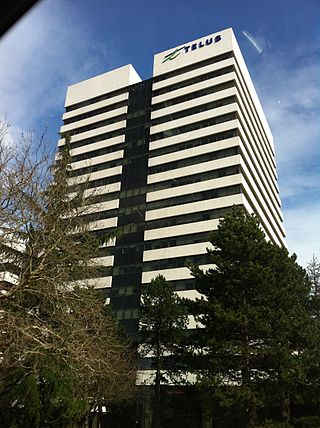Related Research Articles
The Kingsbury Commitment is a 1913 out-of-court settlement of the United States government's antitrust challenge against the American Telephone and Telegraph Company (AT&T) for the company's then-growing vertical monopoly in the telecommunications industry. In return for the government's agreement not to pursue legal action against the company as a monopolist, AT&T agreed to divest the controlling interest it had acquired in the Western Union Telegraph Company, and to allow non-competing independent telephone companies to interconnect with the AT&T long-distance network.

A telecommunications company is a kind of electronic communications service provider, more precisely a telecommunications service provider (TSP), that provides telecommunications services such as telephony and data communications access. Many traditional solely telephone companies now function as internet service providers (ISPs), and the distinction between a telephone company and ISP has tended to disappear completely over time, as the current trend for supplier convergence in the industry develops. Additionally, with advances in technology development, other traditional separate industries such as cable television, Voice-over IP (VoIP), and satellite providers offer similar competing features as the telephone companies to both residential and businesses leading to further evolution of corporate identity have taken shape.
The Mann–Elkins Act, also called the Railway Rate Act of 1910, was a United States federal law that strengthened the authority of the Interstate Commerce Commission (ICC) over railroad rates. The law also expanded the ICC's jurisdiction to include regulation of telephone, telegraph and wireless companies, and created a commerce court.

The Communications Act of 1934 is a United States federal law signed by President Franklin D. Roosevelt on June 19, 1934, and codified as Chapter 5 of Title 47 of the United States Code, 47 U.S.C. § 151 et seq. The act replaced the Federal Radio Commission with the Federal Communications Commission (FCC). It also transferred regulation of interstate telephone services from the Interstate Commerce Commission to the FCC.

Telus Communications Inc. (TCI) is the wholly owned principal subsidiary of Telus Corporation, a Canadian national telecommunications company that provides a wide range of telecommunications products and services including internet access, voice, entertainment, healthcare, video, smart home automation and IPTV television. The company is based in the Vancouver, British Columbia, area; it was originally based in Edmonton, Alberta, before its merger with BC Tel in 1999. Telus' wireless division, Telus Mobility, offers UMTS, and LTE-based mobile phone networks. Telus is the incumbent local exchange carrier in British Columbia and Alberta. Its primary competitors are Rogers Communications and Bell Canada. Telus is a member of the British Columbia Technology Industry Association.

The telecommunications policy of the United States is a framework of law directed by government and the regulatory commissions, most notably the Federal Communications Commission (FCC). Two landmark acts prevail today, the Communications Act of 1934 and the Telecommunications Act of 1996. The latter was intended to revise the first act and specifically to foster competition in the telecommunications industry.

Bell Canada is a Canadian telecommunications company headquartered at 1 Carrefour Alexander-Graham-Bell in the borough of Verdun, Quebec, in Canada. It is an ILEC in the provinces of Ontario and Quebec; as such, it was a founding member of the Stentor Alliance. It is also a CLEC for enterprise customers in the western provinces.
Universal service is an economic, legal and business term used mostly in regulated industries, referring to the practice of providing a baseline level of services to every resident of a country. An example of this concept is found in the US Telecommunications Act of 1996, whose goals are:
An incumbent local exchange carrier (ILEC) is a local telephone company which held the regional monopoly on landline service before the market was opened to competitive local exchange carriers, or the corporate successor of such a firm.
In telecommunications, a long-distance call (U.S.) or trunk call is a telephone call made to a location outside a defined local calling area. Long-distance calls are typically charged a higher billing rate than local calls. The term is not necessarily synonymous with placing calls to another telephone area code.
Alberta Government Telephones (AGT) was the telephone provider in most of Alberta from 1906 to 1991.

The Interstate Commerce Act of 1887 is a United States federal law that was designed to regulate the railroad industry, particularly its monopolistic practices. The Act required that railroad rates be "reasonable and just", but did not empower the government to fix specific rates. It also required that railroads publicize shipping rates and prohibited short haul or long haul fare discrimination, a form of price discrimination against smaller markets, particularly farmers in Western or Southern Territory compared to the official Eastern states. The Act created a federal regulatory agency, the Interstate Commerce Commission (ICC), which it charged with monitoring railroads to ensure that they complied with the new regulations.

A public service company is a corporation or other non-governmental business entity that delivers public services—certain services considered essential to the public interest. The ranks of such companies include public utility companies like natural gas, pipeline, electricity, and water supply companies, sewer companies, telephone companies and telegraph companies. They also include public services such as transportation of passengers or property as a common carrier, such as airlines, railroads, trucking, bus, and taxicab companies.
The Universal Service Fund (USF) is a system of telecommunications subsidies and fees managed by the United States Federal Communications Commission (FCC) to promote universal access to telecommunications services in the United States. The FCC established the fund in 1997 in compliance with the Telecommunications Act of 1996. Originally designed to subsidize telephone service, since 2011 the fund has expanded its goals to supporting broadband universal service. The Universal Service Fund's budget ranges from $5–8 billion per year depending on the needs of the telecommunications providers. These needs include the cost to maintain the hardware needed for their services and the services themselves. In 2022 disbursements totaled $7.4 billion, split across the USF's four main programs: $2.1 billion for the E-rate program, $4.2 billion for the high-cost program, $0.6 billion for the Lifeline program, and $0.5 billion for the rural health care program.

United States v. AT&T, 552 F.Supp. 131 (1982), was a ruling of the United States District Court for the District of Columbia, that led to the 1984 Bell System divestiture, and the breakup of the old AT&T natural monopoly into seven regional Bell operating companies and a much smaller new version of AT&T.

The Bell System was a system of telecommunication companies, led by the Bell Telephone Company and later by the American Telephone and Telegraph Company (AT&T), that dominated the telephone services industry in North America for over 100 years from its creation in 1877 until its antitrust breakup in 1983. The system of companies was often colloquially called Ma Bell, as it held a vertical monopoly over telecommunication products and services in most areas of the United States and Canada. At the time of the breakup of the Bell System in the early 1980s, it had assets of $150 billion and employed over one million people.

AT&T Corporation, an abbreviation for its former name, the American Telephone and Telegraph Company, was an American telecommunications company that provided voice, video, data, and Internet telecommunications and professional services to businesses, consumers, and government agencies.
The International Bell Telephone Company (IBTC) of Brussels, Belgium, was created in 1879 by the Bell Telephone Company of Boston, Massachusetts, a precursor entity to the American Telephone and Telegraph Company (AT&T), initially to sell imported telephones and switchboards in Continental Europe.
The history of AT&T dates back to the invention of the telephone. The Bell Telephone Company was established in 1877 by Alexander Graham Bell, who obtained the first US patent for the telephone, and his father-in-law, Gardiner Greene Hubbard. Bell and Hubbard also established American Telephone and Telegraph Company in 1885, which acquired the Bell Telephone Company and became the primary telephone company in the United States. This company maintained an effective monopoly on local telephone service in the United States until anti-trust regulators agreed to allow AT&T to retain Western Electric and enter general trades computer manufacture and sales in return for its offer to split the Bell System by divesting itself of ownership of the Bell Operating Companies in 1982.

Telus Corporation is a Canadian publicly traded holding company and conglomerate, headquartered in Vancouver, British Columbia, which is the parent company of several subsidiaries: Telus Communications Inc. offers telephony, television, data and Internet services; Telus Mobility, offers wireless services; Telus Health operates companies that provide health products and services; and Telus Digital operates worldwide, providing multilingual customer service outsourcing and digital IT services. Telus has a long history and is listed with the Toronto Stock Exchange.
References
- 1 2 Lloyd, Mark. "AT&T and Whatever happened to Antitrust?" . Retrieved 12 Jul 2024.
- ↑ Wilson, Kevin G. (2000). Deregulating telecommunications: U.S. and Canadian telecommunications, 1840-1997 . Rowman & Littlefield. pp. 19. ISBN 0-8476-9825-4.
- ↑ Loeb, G. Hamilton (1977). "The Communications Act Policy Toward Competition: A Failure to Communicate". Duke Law Journal. 1978 (1). Retrieved January 22, 2024.
- ↑ Pub. L. 67–15, 42 Stat. 27
- 1 2 "A Brief History: Origins". History of AT&T. Retrieved 3 May 2011.
- 1 2 Wilson, Kevin G. (2000). Deregulating telecommunications: U.S. and Canadian telecommunications, 1840-1997 . Rowman & Littlefield. pp. 17. ISBN 0-8476-9825-4.
- ↑ Huber, Kellogg, Thorne (1999). Federal telecommunications law. Aspen Publishers. p. 215. ISBN 0-7355-0647-7.
{{cite book}}: CS1 maint: multiple names: authors list (link) - ↑ Northrup, Cynthia Clark (2003). The American economy: a historical encyclopedia . ABC-CLIO. pp. 351. ISBN 1-57607-866-3.
